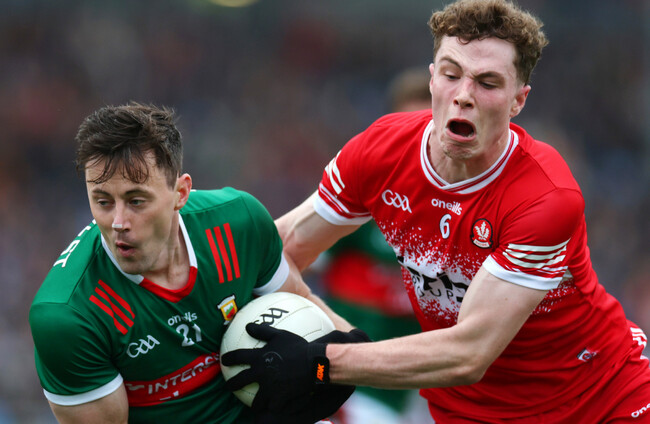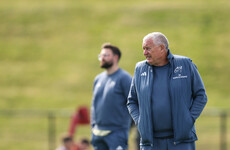THERE ARE A few books that have never been given a permanent spot on my bookshelves. It is a matter of easy access, really, for they have yet to exhaust their usefulness. Breandán Ó hEithir’s spellbinding memoir, Over The Bar: A Personal Relationship with the GAA is one such book.
Forty years after it was published, it does not require much of a summary beyond what its subtitle promises. Ó hEithir takes “the GAA” on the broadest of terms. He guides us through its phenomenal ability to reveal itself in many subjective facets of Irish life. Only, while that subjectivity might appear aligned to a particular place or time, there is an odd prescience to much of what he has to say. The GAA – as a sporting organistion, as a community, as a source of conversation – just hasn’t changed all that much.
As I have become grimly fascinated by the current discourse surrounding Gaelic football and its issues, I figured that Ó hEithir must have had some point to make on the matter.
“I find it most appropriate that a medical doctor (Mick Loftus) has been elected President at a time when football, if it were human and his patient, would probably be in an intensive care unit,” he wrote of the game’s well-being in the mid-1980s. “Much as I favour the advancement of hurling it must be admitted that the resolution of the problems of football is the GAA’s single most pressing problem at the moment.”
It may have prompted a wry smile from him to see how little things have changed were it not so utterly depressing.
Why does Gaelic football lend itself to such never-ending dissatisfaction?
For all that it can be regarded as a sport which inspires mass participation among players and supporters at all levels, every year coincides with a fresh enthusiasm to discuss why the game has gone to shite.
It’s admirable, on one level, that people feel comfortable enough to criticise it. Hurling could certainly do with less cheerleading and more concern for how unbalanced a game it is on the national level. Yet it seems that no solution to Gaelic football’s woes is ever enough.
One allowance Ó hEithir made for the game’s well-being in the 1980s concerned two teams that seemed to exemplify the latent potential of Gaelic football.
“It can be fairly said that Kerry and Dublin have been the life-support machine of Gaelic football for a decade,” he wrote, “earning the big money for the GAA and showing what Gaelic football at its best can be, as a game and a spectacle.”
In 2024, the prospect of an All-Ireland final featuring both those counties seems to be about the only eventuality that would be warmly received by the most amount of people. To the extent that Kerry and Dublin, particularly, have been a force for all that’s good about Gaelic football in the last decade, however, I suspect that their permanence is in fact more indicative of the major issue than the solution.
Firstly, let’s get this out of the way. Neither Dublin nor Kerry are at fault here, and their successes are in no way diminished. Dublin’s footballers have elevated the game to a point where the occasional breakthroughs for other counties (even Kerry, increasingly) seem almost harder won. And Kerry’s David Clifford is the closest thing Gaelic football has had in recent generations to a Michael Jordan, such is the inescapable pull to watch him play in any circumstances at all. When both counties likely meet at some stage of this year’s championship it will have the feel of a game that transcends its own place and time.
Yet, despite the significant changes Gaelic football has undergone trying to address the issues Ó hEithir was writing about and those that are still discussed today, we ultimately find ourselves in the same place. It is for this reason that the well-meaning work of Jim Gavin and his Football Review Committee do not necessarily fill me with confidence.
I appreciate that their stated aim is to provide “the best possible games experience for players and spectators”, and not simply improve the inter-county game. Yet, as the GAA President Jarlath Burns has said in relation to the Association’s attempts at raising funds, an entity such as GAAGO is built upon the assumption that people will want to pay to watch the best teams in the country play.
Any change made to Gaelic football therefore is a change that intends to influence how we regard the game at the elite level. However successful the committee’s proposed changes might be, there is little to suggest that they will upend the status quo. At best, Dublin and Kerry might find new ways to amaze us.
In an age when everyone with an interest in Gaelic football seems to have an idea for its salvation, I have no detailed manifesto for change. What seems obvious though is that fewer people would be complaining if there was a less predictable championship; a reduction of the reliance on Dublin and Kerry to keep the game afloat. No amount of rule changes or tweaks to the current model will enable that.
The only possibility for meaningful change is the one thing that’s never been tried: wholesale revolution. Dump the current format and start from scratch with a realistic acknowledgement of each county’s capabilities. Construct two or even three tiers to the county game in accordance with the club model and allow for a more consistent quality of play and opposition that is not rooted in the arbitrariness of geography.
After all, there was a time even in Stephen Cluxton’s career that the Leinster championship held real meaning. To suggest at any point pre-2011 that it could become an annual procession for one county would have seemed ludicrous. It is unlikely that the All-Ireland championship could go the same way given the wider variety of teams competing in it, but what evidence of the last decade or so would suggest that it is becoming more and not less of an open competition?
Ó hEithir concludes Over The Bar with a warning: “Those who control the GAA’s affairs must try to differentiate between genuine constructive criticism . . . and the crepitations of the Humpty McDumpty’s who . . . are very often second-division mice attempting to be first-division rats – and failing.”
He wasn’t referring to Gaelic football particularly, but the same wariness should apply.
The cause for radical change has already been made, but this criticism does not inevitably indicate that Gaelic football is generally in a bad place. There’s a lot more to this game than where the Sam Maguire Cup ends up and while a competition like the Tailteann Cup may not yet (or may never) have captured the attention of all Gaelic football supporters, anyone who watched the weekend’s semi-finals could surely attest to the quality of those games.
Yet, the allure of the top tier competition and its stated flaws continues to influence the general impression of this sport. To truly measure the success of Gaelic football one need only look at hurling. Listen to what most of that game’s leading advocates focus on and you could be fooled into believing that hurling is the game which is thriving in all corners of the country while football dies on the vine. Hurling’s well-being is as much a problem for the GAA to solve as how Gaelic football is getting on, but the public perception of how both are faring is critically flawed.
I cannot pretend to know the exact state of Gaelic football in that period when Ó hEithir was writing, and given that he is 34 years dead we will never know if his opinion might have been altered by the general standard of play that is currently on show. What Over The Bar does celebrate, however, is the spirit and power of change. Hence his hopefulness that constructive criticism might be heard over the din of ceaseless negativity.
Gaelic football possesses a broad appeal that reflects both its brilliance and its vulnerability. At its highest level, the game has been compromised by a lack of competition. And yet, at every other level people continue to play and support it with an enthusiasm that bears little connection to whether or how this problem might be solved.
There are a good number of people who talk about Gaelic football’s problems because they want the game to excel. And then there are those for whom its issues more cynically serve to confirm what they believe are its intractable flaws.
Breandán Ó hEithir had a name for that latter bunch.














To say that Kerry and Dublin have been the force for everything that’s good about football over the last decade is a bit ingenious to another team that even though they didn’t win the big one were fairly entertaining and played the game as it should be played. And their neighbours in the maroon do the same. It’s actually strange how teams deploy a blanket defence when the attacking teams have won more All-Irelands and competed against attacking teams in the final over the last few years. The fear of losing is killing the game.
@David Staed: yes Mayo have given great entertainment/frustration over the past few years
The professor
Great article, maybe the idea of putting the county game on different levels like the club game could be looked at but we only have34 teams so how can we divide into meaningful championship?